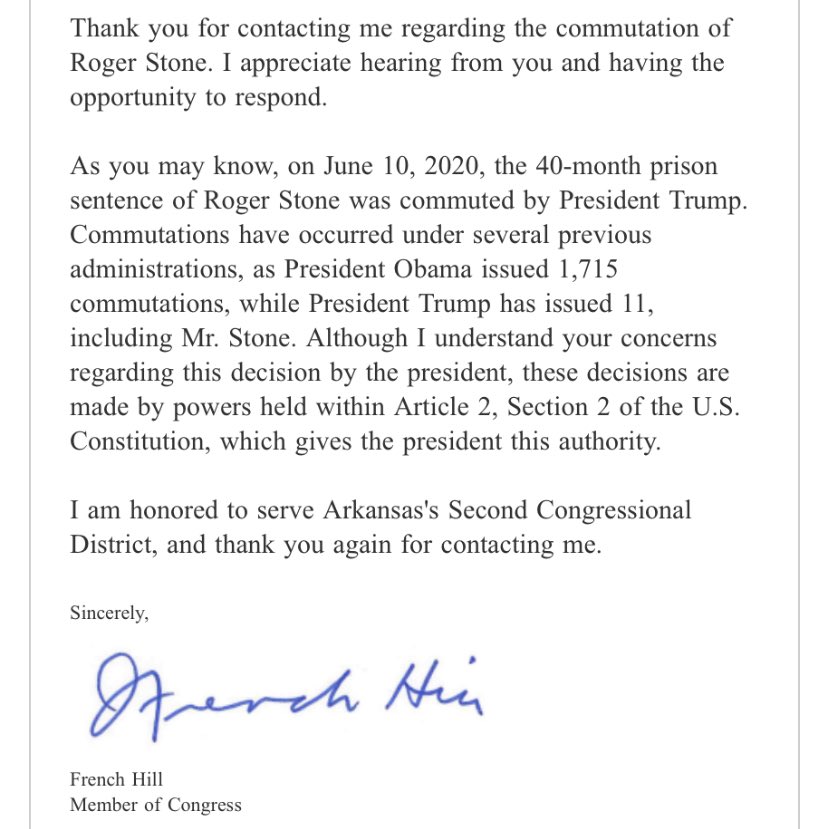It is no stretch to say that Representative French Hill (AR-02) has accomplished pretty much nothing during his tenure in Congress. If there is an upside to being an inconsequential backbencher, however, it is that it frees Rep. Hill to craft highly disingenuous responses to communications from constituents.
Take this one, for example. Recently, a constituent sent Hill a question related to President Donald Trump’s commutation of Roger Stone’s prison sentence, writing:
I believe President Donald Trump used his executive power to commute the sentence of Roger Stone in an improper way. The president should not be able to pardon witnesses involved in the investigation of the president. What are you going to do to prevent our Republic for falling further down the corruption ladder? I’m serious. What is going on over there? Do something.
In response, Hill sent the following:

That Hill ultimately chalked it up to, “well, the constitution lets him do it” is not remotely surprising. That’s just the kind of moral jellyfish that Hill has continually proved himself to be. What is interesting, though, is that Hill tried to justify the commutation of Stone’s sentence by saying, essentially, that former President Barack Obama commuted more sentences during his tenure.
This obviously canned response raises at least two issues. First, so what? Obama’s number of commutations is literally irrelevant when the question posed is about the specific commutation of Roger Stone’s sentence and not about, say, the total number of commutations granted by Trump. Hill’s response is no different than someone asking you not to mow your lawn at 5am and you responding with “the guy who lived here before me mowed the yard far more often!”
Secondly, though, Hill’s reference to Obama’s number of commutations as justification for the Stone commutation is grossly misleading, because it omits all context. In 2014, the Obama administration enacted the Clemency Initiative, in which the Justice Department encouraged “qualified federal inmates” to apply to have their sentences commuted. Under that initiative, the DOJ would “prioritize clemency applications from inmates who meet all of the following factors:
- They are currently serving a federal sentence in prison and, by operation of law, likely would have received a substantially lower sentence if convicted of the same offense(s) today;
- They are non-violent, low-level offenders without significant ties to large scale criminal organizations, gangs or cartels;
- They have served at least 10 years of their prison sentence;
- They do not have a significant criminal history;
- They have demonstrated good conduct in prison; and
- They have no history of violence prior to or during their current term of imprisonment.”
The point of the Clemency Initiative was to take federal inmates who were in prison for low-level drug crimes and make their sentences more in line with what those sentences would be if those people had been convicted under the laws in place in 2014 (or later), rather than under the far more draconian war-on-drugs era laws. As Deputy Attorney General James M. Cole explained the initiative:
“For our criminal justice system to be effective, it needs to not only be fair; but it also must be perceived as being fair. Older, stringent punishments that are out of line with sentences imposed under today’s laws erode people’s confidence in our criminal justice system, and I am confident that this initiative will go far to promote the most fundamental of American ideals – equal justice under law.”
Just for giggles, contrast Roger Stone’s sentence and commutation with the criteria listed above. Stone was not “currently serving a federal sentence in prison” at the time of the commutation. His 40-month sentence was less than the seven to nine years that the government initially sought, and it was right in line with the three to four years the government requested after switching prosecutors mid-stream. Stone was non-violent, but the whole “low-level offender[] without significant ties to large scale criminal organizations” is inapplicable to Stone. Stone did not serve a day of his sentence, let alone “at least 10 years,” meaning there is also no “good conduct in prison” that he could demonstrate.
In short, even if French Hill wants to act like Obama was profligate in his commutation of sentences,1 the fact remains that Roger Stone would not have qualified for a commutation under the rules that Obama used for those 1700+ commutations. So maybe that comparison is not the slam dunk that Hill and his communications team seem to think it is.
Also worth noting, for context, is that Obama received more applications for clemency than the nine presidents who came before him combined, and he ultimately granted a lower percentage of those requests than any president since 1900 other than George W. Bush.↩
